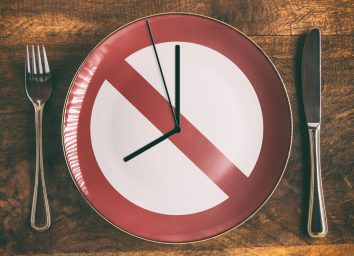Try This Intermittent Fasting Tip to Lose Stubborn Fat, Expert Says

You’ve probably heard about—or even experimented with—intermittent fasting (also known as time-restricted eating), which can promote a slew of health benefits, including disease prevention and weight loss.
Still, you may not be clued into one nuance of intermittent fasting that can help make it both incredibly beneficial and easier to embrace: harnessing your intuition to guide your eating patterns.
In his new book Intuitive Fasting, Dr. Will Cole, a leading function-medicine expert, maps out a four-week plan for resetting your hunger signals and recharging your metabolism by trading prescribed eating times for ones that innately work for you. “The truth is, most of us have been following an artificially constructed schedule that does not reflect our bodies’ natural and most optimal eating schedule,” says Dr. Cole. “In fact, eating three meals every day can cause metabolic inflexibility, which can easily lead to inflammation, weight gain, fatigue, and chronic health problems. (To gauge your own metabolic flexibility, take this quiz.)
So, how does intuitive fasting help you shed unhealthy excess weight? “When blood sugar is balanced, satiety signaling is improved and metabolism is more stable, enabling us to eat and gently fast intuitively,” says Dr. Cole. “By being in touch with your body, you have greater agency over how, when, and what you eat, instead of food controlling you.”
What follows are a few more pointers for tapping into your biological cues to support healthy weight loss:
Look to the sun

Our bodies operate on a daily sleep-wake cycle (the circadian rhythm). “Our metabolism also adapted to eating during the day and sleeping at night,” reminds Dr. Cole. “So if you eat before bed, just as your metabolism is slowing, it can cause your body to store those calories as fat instead of using them for fuel.”
End dinner by 8 pm

Some studies show that eating after 8 pm has been associated with higher leptin levels and more weight gain. While you’re at it, skip the evening alcohol too. It’s just empty calories in a glass, and research from The Sleep Foundation shows that it messes with your sleep (which in turn, can cause weight gain).
Try a 12-hour window

One way to warm up to time-restricted eating is to choose a 12-hour eating window (say, 8 am-8 pm), followed by a 12-hour fasting window (8 pm-8 am). This is a fairly simple way to begin to curb unhealthy habits, such as mindless late-night snacking.
Drink more water

Aim for half your body weight in ounces. Being adequately hydrated will give you more energy, preventing you from reaching for a misguided quick energy fix in the form of sugar. It will also ensure that you don’t mistake thirst for hunger. If you can’t get down one more glass of water, try this hydrating cuke juice.
One final, but important note: Fasting is not for everyone, as Dr. Cole explained in this Instagram post, stating: “I say very clearly throughout the book to discuss [any eating protocol] with your eating disorder specialist and doctor.” If it’s right for you, intuitive fasting and intuitive eating can be a path to healthy, sustainable weight loss and overall food peace.
For more, check out these 15 Underrated Weight Loss Tips That Actually Work.








